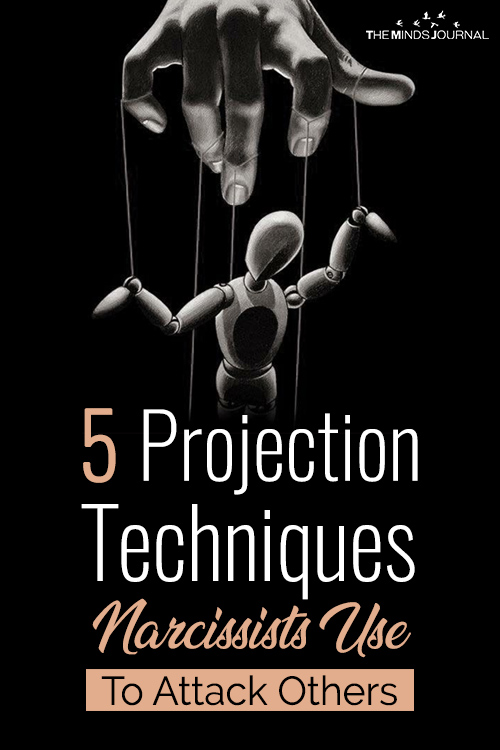One of the most powerful and twisted weapons of a narcissist is their power of projection. Through their manipulative projection techniques, they control and manipulate the people around them to do their bidding.
The narcissist’s self-esteem and self-worth depend on how other people perceive them, as most of them generally lack self-awareness.
They tend to deny flaws in themselves and put the blame on others for their personal shortcomings, misfortunes, and mistakes. There is even a word for this mess: it’s called projection. People with narcissistic tendencies are projection-heavy individuals.

In what follows we’ll explore 5 different ways narcissists with sociopathic and psychopathic tendencies project, blame, deny, confuse, and hurt the people around them.
Here Are 5 Projection Techniques Narcissists Use To Attack Others
1. They Put The Blame On Others For Their Own Advantage.
If they themselves ask for remorse, what they’re truly asking is to guilt you so they can better hide what they do not want you to know. And since it is never their own fault, this gives them another way to pass the blame. It works as a therapeutic release for a collective group of narcissists to always be demanding and receiving a public apology.
Additionally, gaslighting is a known method they use for twisting reality to make others doubt themselves so they can further their own agenda.
As defined on Wikipedia: “Gaslighting or gas-lighting is a form of mental abuse in which information is twisted or spun, selectively omitted to favor the abuser, or false information is presented with the intent of making victims doubt their own memory, perception, and sanity.”
Related: The Ten Narcissistic Commandments
2. They Play The Victim.
Playing the victim is a common narcissistic strategy. Rather than working through it internally or face to face with the other person, they have no issue with dragging others into it by lying and painting you a the abuser and themselves as the victim. This regularly involves a preemptive strike or a provocation to get a reaction.
For instance, slandering you, destroying your property, turning others against you, or physically attacking you. And as soon as you respond appropriately to their active or passive aggression, they will say that you’re the aggressor because you are hurting them or that you’re unreasonable because of your “unacceptable, animalistic behavior.”
It’s sneaky and calculated, and again, it involves accusing you of things they have done or are doing themselves. So it’s not surprising that the audience of such drama does not see the whole picture or does not care enough to familiarize themselves with the full story.
Many of them even might take the side of the narcissist. The narcissist is doing whatever they can for their spectacle to be believed for the sake of their emotional management, so much as so they will do and say almost anything.
For them, it is rarely about truth and almost always about their audience’s perception.
In this way, they receive the false validation that they are righteous and good and that you are wrong and evil. Their sense of self-esteem can now be restored and their feelings of inadequacy and shame are managed. So it’s all fine and dandy.
Except for those on the receiving end – but who cares about them, right?
3. Triangulation.
This method is often used in highly conflicted family situations involving a family member who is narcissistic but it can also happen among other social circles outside the family setting.
Triangulation means a rise of tension between family members due to one person selectively communicating or not communicating the truth in full, misleading, and creating a different version of the story in a way that creates tension between the other members.
Often the goal for the narcissist is to find a scapegoat.
They would usually need to find an easily manipulative partner they can dominate or someone who can cover for them and/or they can put the blame on when things get heated.
However, they can only fool someone who wants to be fooled. They cannot hide, and they are always found out sooner or later.
Their stories are usually not consistent and many pieces of relevant information are often missing. Oftentimes they are unable to notice their own mental blind spots, and the responsibility then heavily relies on the enabling person for letting it go or not acknowledging it when they are fully aware of what’s going on.
Related: Projection: The Lethal Weapon Narcissists and Abusers Use To Manipulate Others
4. They Call You Things That You Are Not.
A good example here is blaming you for cheating on them when you are not while doing exactly that behind your back.
It can also be something along the lines of “You only think about yourself and you’re selfish because you’re not doing what I’m asking you to do.” At the same time, they are the ones who make never-ending excuses, break their own promises, are unreliable, think only about their own needs, or compete with you. In addition, they will also conveniently forget all the things that you have done for them.
In their view, they’re entitled to all of your resources. You are aggressing against them when you won’t, can’t, or don’t provide them with what they want.
They will try to use various abuse and manipulation tactics like mocking, name-calling, bullying, triangulation, berating feelings, obscuring the issue, gaslighting, provoking, guilt-tripping, criticizing, or nitpicking, to make you feel bad and eventually give in to their demands.
If it’s not directed at you, then it’ll be directed at somebody else. “Look how terrible this person is! And do you know what they did?” What this translates to is, forget about me; let’s find someone else with flaws and talk about them instead.
In their mind, that way, “we don’t have to think about my shortcomings, or we will reach a conclusion that I am great by default because someone else is terrible.”
5. They Have Unrealistically High Expectations Of Life.
Beneath the narcissist’s disguise are layers and layers of false pretenses they’ve created through the years.
As a consequence of their false sense of grandeur, overcompensation, unrealistic expectations and demands become a constant part of their life equation. They then nurture the image of an overgrown man-baby or a princess who thinks the world owes them everything while clothing themselves in an appearance of superiority.
Self-perceived notions of grand roles or the creation of some sort of a “life fantasy” adds up to their numerous layers of false pretenses. Religiosity for one is often used as an escape or cover while associations with words like the perfect family, man/woman of my dreams, life savior, prince charming, and other means of attaining some sort of “fix” could also be a symptom.
Accepting reality is a struggle for them as they cannot relate to a process but just see the result they wish to get. If you attempt to explain to them what is really happening, they will see you as someone who’s making an excuse. No matter what you do it’s never enough for them, and as hard as you try you cannot win, because of their inability to see or acknowledge the so-called “little things” that happen behind the scenes.
Related: Beware Of Projection: A Blame-Shifting Tactic Of The Extreme Narcissist
They will do anything to avoid accepting reality and become a decent person – and yet they can quite convincingly act as one.
Have you experienced any of these things when dealing with narcissistic people?
Written by Kris Di Originally appeared in IHeart Intelligence











Leave a Reply